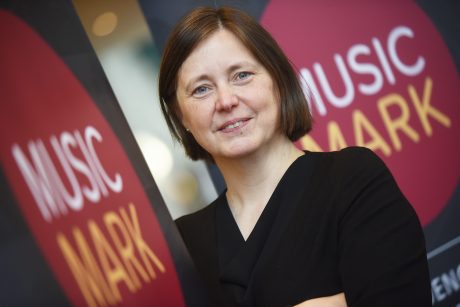Bridget’s Blog: Mobile music libraries and CD Clubs
12th December 2022

Music Mark CEO Bridget Whyte
Having made her annual visit to Cardiff University to give a lecture to second-year Music students, Bridget shares some of the students’ insights and suggestions about what they would do to improve music education.
The phrase ‘never work with children and animals’ was apparently coined by W C Fields and of course was linked to show business – more specifically the unpredictable behaviour of children and animals on set and stage. I would agree that it is partly true as anyone who has attended an online session that I have hosted will have experienced my cat’s great ability to pop into view just as I’m making a key point. However, I would challenge the idea of never working with children!
Working in Music Education it would be a ridiculous concept not to work with children and young people, and yet, Music Mark as an organisation rarely does. We are delighted to have young people participate in events such as our conferences – three key highlights this year were Jack and his mum talking to us in Derby about his autism as a musician; the pupils from primary schools in Calderdale demonstrating the My Voice Matters project in Newcastle and the students from Middlesbrough Open Up orchestra talking about their experiences of an inclusive music education, and also finishing the Newcastle conference with an amazing performance. However, on a day-to-day basis it’s not often that we engage with young people.
Each year though I take a train to South Wales and spend a couple of hours with some second-year students at Cardiff University. Charles Wilson kindly invites me to give a lecture about ‘The Business of Music Education’ where I explain what is going on in the Music Education sector, give them some ideas of careers in the industry and open the floor to their thoughts on how to make Music Education better. They never fail to remind me why listening to young people is so valuable.
I’ve given the lecture five years in a row now and it’s been so interesting to hear what the students have to say, especially about their recent experiences of school. Many benefitted from Whole Class/WCIT (this year, trumpet, ukulele and djembe were mentioned), singing with the aid of Sing Up and some had been in a small group (or even been the only student) studying A-Level. Split into groups I ask them to consider what primary, secondary, music service or community provision should look like for the next generation and their responses are as varied as the cohorts of students.
This year some of the great responses to how Music Education could be improved included:
- Encouraging and developing creativity through musical games, and teaching a variety of instruments in primary.
- Open access to communal instruments and finding ways to make musical learning more inclusive in secondary.
- The music service group had lots to say including a repair shop students can access (for that emergency repair before an exam/performance) and the provision of a music library (on wheels going round to schools lending music to students to learn).
- Music education in the community included setting up a book club in CD form and including live music at community events and in the pub.
What is always interesting to me is how the educational experiences of the students invariably inform their answers to what music education should look like for the next generation. We had quite a few students from East Asia in the group this time and they brought a different perspective to the discussions, but despite that, many of the ideas written down focused on quite a traditional musical learning offer – theory, history, choirs and orchestras.
As I headed home at the end of the day, I wondered whether until we change the narrative given to children and young people in schools and more widely around music it is going to be hard to remove the unconscious bias which is being embedded into students’ psyches. It made me reflect further on a few of the sessions at the Music Mark Annual Conference Series this year, and the ongoing discussion nationally about diversifying music education. It’s certainly something we should continue to discuss with a view to sow more seeds of change for a more diverse future for the sector.
Every year in Cardiff, I hear at least one or two ideas from students which I end up repeating to colleagues, in meetings or adding into editorials like this, and I’m delighted that this year was no different. I think the idea of a mobile library of sheet music students can explore and borrow to learn is great, and I’m up for joining a CD club if anyone wants to start one!


